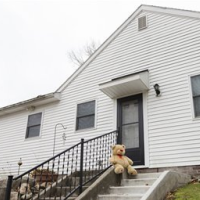Colorado Murderers who Kill Children Get Lighter Sentences than those who Kill Adults
 Teddy Bear left in honor of e children murdered in Toledo, Ohio, November 13, 2012 (photo: Rick Osentoski, AP)
Teddy Bear left in honor of e children murdered in Toledo, Ohio, November 13, 2012 (photo: Rick Osentoski, AP)
American society places a low value on the lives of children, especially when it comes to punishing those who take their lives. According to a Denver Post investigation of Colorado sentencing records from 2007 to 2011, sentences for child-killers were significantly shorter than for adult-killers whose homicides occurred under similar circumstances.
Specifically, Coloradans convicted of “child abuse resulting in death” were sentenced to an average of 29.9 years in prison, 25% less than those who were sentenced to an average of 37.4 years for the equivalent charge of second-degree murder of an adult. Those convicted of the less serious charge of “child abuse negligently causing death” got 13.6 years, 42% less time than those sent down for 19.4 years on comparable charges of negligent homicide of an adult.
The difficulty of prosecuting child-killers is “a national problem,” Victor Vieth, director of the Minnesota-based National Child Protection Training Center, told Post reporters. “These cases are more difficult than your typical homicide for many reasons.”
“Most of the time, kids are not shot. They are abused or neglected,” said Weld County District Attorney Ken Buck. “The adult homicide cases, if one gang member shoots another gang member, there is little doubt about what the intent is. But when a parent is involved, is the parent punishing the child? Is the parent in a rage? It gives the jury less certainty (about intent).”
Often, the witnesses are other children whose testimony jurors may find unreliable. Even when, out of all the adults in a child’s life, the perpetrator can be identified, expert medical or psychological testimony can be confusing and even contradictory.
“You’ll have a lot of folks on juries who will look at these perpetrators and say, ‘I’ve been frustrated with my kids, I understand why you might lose your temper,’” Vieth said. Although Vieth’s organization teaches prosecutors, investigators and others working on child abuse cases techniques for interviewing children, only 17 states have instituted the training. Colorado is not among them.
Perhaps the most fundamental reason for the hesitancy to punish child abusers can be traced to lingering attitudes about a parent’s right to discipline a child, Vieth observed.
“In all 50 states, it’s lawful to hit kids. In 19 states, it’s still lawful to hit kids with boards in schools. But if you hit an adult, it’s assault,” said Vieth. Underscoring the contrast is the fact that after years of activism against spousal violence, police in Colorado (and in many other jurisdictions) responding to such calls must take someone into custody—if both the parties involved are adults, but not if one is a child.
Under state law, “there is no mandated arrest for parents beating kids,” said Jeff Koy, a lawyer for the Rocky Mountain Children’s Law Center. Vieth boils the problem down to its essence: “We just don’t value children and their lives to the extent we do adults.”
-Matt Bewig
To Learn More:
Short on Justice: Penalties for Child Deaths less Severe than for Adults in Colorado (by Karen Augé and Kirk Mitchell, Denver Post)
- Top Stories
- Unusual News
- Where is the Money Going?
- Controversies
- U.S. and the World
- Appointments and Resignations
- Latest News
- Trump to Stop Deportations If…
- Trump Denounces World Series
- What If China Invaded the United States?
- Donald Trump Has a Mental Health Problem and It Has a Name
- Trump Goes on Renaming Frenzy






Comments